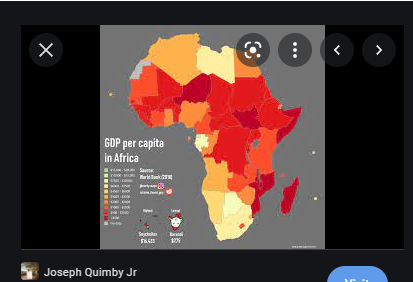By Jeph Ajobaju, Chief Copy Editor
Despite Abuja’s hoopla about Nigeria having the biggest economy in Africa with a $468.6 billion Gross Domestic Product (GDP), the country ranks low in the metrics of GDP per capita which divides GDP by population size.
Seychelles with an estimated population of 98,462 and a GDP of $1.24 billion had GDP per capita of $11,425.09 in 2020, the highest on the continent, despite a 29.5 decline on the figure for 2019.
Nigeria has a population of 206.1 million, according to the World Bank, and its GDP per capita was $2,097.09 in 2020, ranking it 17th, a 6 per cent dip against $2,229.86 in 2019.
Other African countries with per capita GDP higher than Nigeria’s include Mauritius, Equatorial Guinea, Gabon, Botswana, and South Africa.
Nairametrics, which reported the World Bank data, recalls that the pandemic disrupted all nations in 2020, grinding economic activities in most countries. Several of them in Africa, including Nigeria, slid into recession.
However, the list of top economies per capita remains fairly unchanged compared to 2019.
World Bank data shows that the Sub-Saharan African economy declined 2.45 per cent to $1.81 trillion in 2020 from $1.85 trillion in 2019. The middle East and North Africa had a 3.66 per cent contraction to an aggregate $3.37 trillion.
Nairametrics analysed the top economies in Africa based on their GDP per capita in 2020 and their performance year-to-date measured on available data.
Here are the top six
Seychelles – $11,425.09 (1st)
Seychelles, located in the Indian Ocean between 480 and 1,600 kilometres from the east coast of Africa, has an estimated population of 98,462 – one of the lowest on the continent.
Its GDP per capita in 2020 was $11,425.09, the highest, despite a 29.5 per cent decline from $16,198.52 in 2019 – caused by a 10.72 per cent dip in GDP to $1.24 billion.
However, Fitch forecasts Seychelle’s GDP will rebound by 5 per cent growth in 2021, driven by a robust resumption of tourist activities, favourable base effects, supported by expansionary fiscal and monetary policies.
Mauritius – $8,622.68 (2nd)
Mauritius had a GDP per capita of $8,622.68 in 2020, the second highest, which was 22.3 per cent lower than $11,097.59 in 2019.
Mauritius is a subtropical island in the Indian Ocean, some 1,130 km east of Madagascar, off the south-eastern coast of Africa.
Its aggregate GDP in 2020 was $11.74 billion, a 14.87 per cent drop against $13.79 billion in 2019.
Equatorial Guinea – $7,143.24 (3rd)
Equatorial Guinea recorded a GDP per capita of $7,143.24 in 2020, the third highest, but it declined 15.2 per cent compared to $8,419.93 in 2019 because of a 4.89 per cent slash in aggregate GDP to $11.88 billion.
Equatorial Guinea is on the west coast of Africa with a population of 1.4 million.
Gabon – $7,005.88 (4th)
Gabon, on the African west coast, boasted the fourth largest GDP per capita of $7,005.88 in 2020 with a 2.23 million population estimated by the World Bank.
The 2020 figure dropped 9.8 per cent against $7,767.02 in 2019, having seen a GDP contraction of 1.32 per cent to $19.67 billion.
Botswana – $6,710.99 (5th)
Botswana, in the centre of southern Africa with a population of 2.35 million, had the fifth highest GDP per capita at $6,710.99 in 2020.
GDP was $17.18 billion, a 7.89 per cent slash compared to $18.65 billion in 2019.
GDP per capita recorded a 15.8 per cent decline from $7,970.
Botswana’s real GDP continues to worsen as a result of the impact of the pandemic, contracting 8.6 per cent year-on-year (YoY) in the first quarter of 2021 (Q1 2021).
South Africa – $5,090.72 (6th)
South Africa, the second largest economy in Africa with an estimated population of 59.3 million, had a GDP per capita of $5,090.72 in 2020 to stand in sixth position.
GDP per capita declined 15.8 per cent from $6,001.4 in 2019.
An average individual in South Africa made an estimated output of $5,090.72 in 2020. GDP grew 1.1 per cent in real terms in Q1 2021.
Finance, mining, and trade industries were the main drivers of output on the production (supply) side of the economy, according to the Statistics Department of the Republic of South Africa (STATSSA).
Household spending and changes in inventories helped spur growth on the expenditure (demand) side.
Nigeria – $2,097.09 (17th)
Nigeria’s GDP per capita was $2,097.09 in 2020 and ranked 17th, a 6 per cent decline compared to $2,229.86 in 2019.
Despite recording the highest aggregate GDP, Nigeria’s GDP per capita paints a less than stellar picture as its 206.1 million population is enormous compared to other African countries.
Nigeria’s population accounts for about 18 per cent of that the entire Sub-Saharan Africa, which affects per capita output. But it is no excuse as the country has the human resources to spur significant economic growth.
Real GDP notched a 5.01 per cent growth in Q1 2021, driven by growth in trade, ICT, and electricity. It had declined 6.1 per cent YoY in Q1 2020.
Bubbling under
Namibia – $4,211.05
Libya – $3,699.23
Egypt – $3,547.87
Eswatini – $3,415.46














